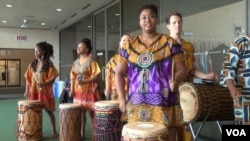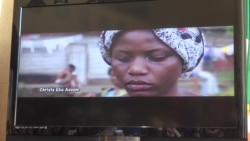To the beat of African drums, a few dozen people gathered at Dallas City Hall Friday to officially kick off the three-day African Film Festival. The event showcases films made by Africans, as well as a few made by non-Africans about issues important to different regions of the continent.
City officials hailed the new festival as an expression of the increasing ethnic and cultural diversity in Texas’ second-largest city.
Regina Hill Onyeibe, the Africa Liaison for the City of Dallas praised the film festival’s organizer and founder, filmmaker Kelechi Eke, not only for bringing this event to Dallas, but for providing an audience for Africans making movies.
She said he had created “a portal in which other Africans can follow their dreams of telling their stories.”
A true picture of Africa
In a VOA interview, Eke, an immigrant from Nigeria with connections to that nation’s film industry, said his idea was to encourage African filmmakers and to present a true picture of Africa and Africans to counter the distorted image often created in mainstream commercial films.
“We wanted to incorporate our culture and our films and share it with the rest of the world and why not Dallas?” he said.
Eke said other Africa film festivals in the United States tended to either showcase Hollywood films about Africa or films made by African Americans. This festival, he said, is centered on Africa, with films that tell deeply rooted cultural stories, as well as spotlighting problems facing many parts of the continent.
An example of the latter is a documentary from Nigeria called “Nowhere to Run,” which shows the shocking effects of environmental damage and global warming on Nigeria. With stunning cinematography, the film shows the destruction of coastal mangroves caused by chemical leaks from oil and gas production, the flooding of some coastal communities caused by rising sea levels, and the decreased size of Lake Chad caused largely by overuse of its water for agriculture.
Another documentary, from Sierra Leone, called “Killa Dizeez,” recounts the toll taken by Ebola during the recent epidemic in Western Africa.
Wide range of topics
There are more than 40 films in the African Film Festival program, most of which are narrative films concerning such things as domestic discord, women’s rights and the troubles of migrant workers. Most are from sub-Saharan Africa, but there is also a film from Egypt and films with connections to Spain, Australia and the United States.
Nigeria, the best represented nation in the festival with 12 films, is home to the so-called Nollywood film industry, the most prolific in Africa. Its narrative films cover a broad spectrum of life in that country, from a man’s obsession with a film star, to the plight of a young woman trapped in a marriage that shatters her dreams of becoming a doctor.
Cameroon is also well represented, with nine films being screened. One film, “Ben and Ara,” tells the story of an agnostic graduate student who falls in love with a woman who is a devout Muslim. Another, “People at Sea,” tells the story of a coastal community moved by the government to an urban center and their struggle to adapt.
Ethiopia's four films includes "Two Zions," which is about the country’s connection with Judaism.
Other African nations represented in the festival include Tanzania, Guinea-Bissau, South Africa, Ghana, Gambia, Uganda and Burkina Faso.
Attracts locals and non-locals
The African Film Festival has drawn support from many of the Africans who live in the Dallas-Fort Worth area of north Texas, which is home to a large share of the 134,000 immigrants from Africa in the Lone Star state, as well as an even larger group of people born in the United States who have at least one African parent.
Non-African residents have also shown interest. BJ Jackson came to the first night of screenings with a friend.
“I think it is really great,” she said. “We have not seen anything like this before, so it was kind of educational for us and we have enjoyed it.”
Historic theater
Most of the screenings are at the historic Texas Theater, best known for having been the place where police arrested Lee Harvey Oswald after he assassinated President John F Kennedy and killed a police officer on November 22, 1963.
Over the years since, the neighborhood has gone through changes, but the theater has remained, with its classic exterior preserved thanks to wealthy contributors who wanted it to remain open as a venue for cultural events like the African Film Festival.







